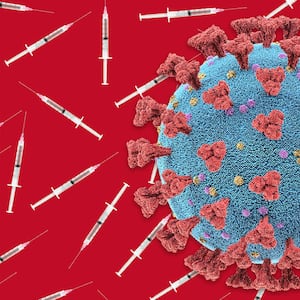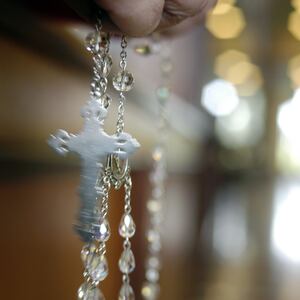Even as it condemned as “morally compromised” a COVID-19 vaccine that the Vatican itself has approved for emergency use, the Archdiocese of New Orleans was being hit with dozens of new clergy sex abuse claims.
The new claims were filed in advance of a March 1 deadline set by the judge in a federal bankruptcy proceeding instituted by the archdiocese in August, citing the double impact of pending sex abuse lawsuits and the pandemic.
The archdiocese was already facing more than 30 outstanding abuse claims and was seeking to curtail future ones. Federal Judge Meredith Grabill set March 1 as a “bar date” for any new claims. Each victim had to fill out and submit a “sexual abuse survivor proof of claim,” reliving the horror with such a stark question as: “Where were you at the time you were sexually abused? Please be specific and provide all relevant information that you recall including the City and State, name of the religious Parish or School or Orphanage (if applicable) and/or the name of any other locations.
And then, “When did the first act of sexual abuse take place? If you do not remember the calendar date, approximately what season of the year was it (spring, summer, fall, winter), approximately what age.”
And then, “If the sexual abuse took place over a period of time, please state when it started and when it stopped. If you were sexually abused by more than one sexual abuser, indicate when the sexual abuse by each of the sexual abusers started and stopped. You may provide approximate dates if you do not recall the specific dates.”
And finally, “Please describe the sexual abuse in as much detail as you can recall in the lines below. You may attach additional pages if needed.”
Just completing the paperwork was often itself a nightmare.
“It can be pretty grueling emotionally,” attorney Kristi Schubert, who assisted a number of victims, told The Daily Beast. “A lot of them never told anyone in their entire life about the abuse. Not their parents, not their spouses, not anyone.”
Some started to fill out a claim without realizing how wrenching it would be, and had to stop.
“They weren’t able to proceed,” Schubert said. “It was just too traumatic to fill out the forms.”
Others found the forms all the more daunting because they had left school as a result of the abuse
“They’re trying to fill out a complicated legal form with words they never learned with a fourth- or fifth-grade education,” Schubert said.
Anybody who did not complete and submit the form by the 5 p.m. deadline likely lost any chance to do so in the future.
“It was now or never,” Schubert said.
And just one business day before the deadline that would allow the archdiocese to escape any future reckoning for past moral outrages, it chose to announce that it found the newest of the three COVID-19 vaccines to be “morally compromised.”
All three vaccines were developed with the help of cell lines derived decades ago from Dutch fetal cells. But the Pfizer and Moderna vaccines used a cell line—in their case derived from a single fetal kidney cell—only for laboratory testing preceding human trials, which the Archdiocese in New Orleans deems acceptable.
“Pfizer and Moderna do not rely on cell lines from abortions in the manufacturing process and therefore can be morally acceptable for Catholics as the connection to abortion is extremely remote,” the archdiocese said in a statement.
But Johnson and Johnson used a cell line—in its case a single fetal retinal cell—in the actual production of its vaccine. And there the discerning moral eye of the archdiocese drew the line.
“The archdiocese must instruct Catholics that the latest vaccine from Janssen/Johnson & Johnson is morally compromised as it uses the abortion-derived cell line in development and production of the vaccine as well as the testing,” the statement concluded.
Maybe the archdiocese thought that by making such a fine distinction it could appear to possess a moral sense. An actual moral sense was demonstrated on March 1 by Bishop Michael Duca over in Baton Rouge.
“If for any reasonable circumstance you are only able to receive the vaccine from Johnson & Johnson, you should feel free to do so for your safety and for the common good,” he said in his own statement.
The Vatican offered a similar opinion in a missive from the Congregation for the Doctrine of the Faith— “Note on the morality of using some anti-Covid-19 vaccines”—which stated that when alternatives are not readily available, “it is morally acceptable to receive Covid-19 vaccines that have used cell lines from aborted fetuses in their research and production.”
“The morality of vaccination depends not only on the duty to protect one's own health, but also on the duty to pursue the common good. In the absence of other means to stop or even prevent the epidemic, the common good may recommend vaccination, especially to protect the weakest and most exposed,” the missive concludes
Victimization of the weakest and most exposed was documented in case after case of child sex abuse that continued to come in just before the deadline in New Orleans. This, just as the archdiocese was questioning the moral value of a life-saving vaccine.
“I was surprised at the timing of that,” Schubert said.
The lawsuits documented in the archdiocese bankruptcy file include one involving a man who died by suicide in 1993 at the age of 29. The family afterwards discovered love letters that had been written to him in his teens by a priest he had first met when he was 10.
Court papers indicate that the dead man’s brother showed the letters to the archbishop, Gregory Aymond, in 2018 as proof of years of abuse. The papers indicate that Aymond—who is now making fine distinctions among vaccines—initially resisted adding the priest to a list of more than 60 known abusers. Aymond is quoted saying that his advisors told him the letters were not “explicit enough.”
Another lawyer handling the church sex abuse cases in New Orleans told The Daily Beast of reading accounts of children being assaulted “anally, orally, vaginally, every which way.” He offered a word to describe the archdiocese now passing moral judgment on an unquestionably pro-life medical measure that could help stop the pandemic.
“Audacity,” he said.



